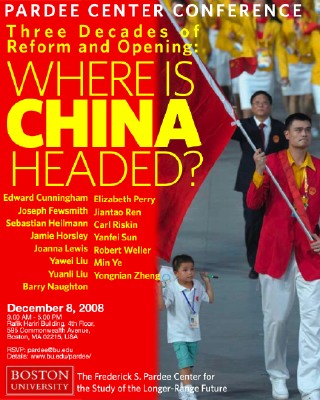"Where is China Headed?" – Keynote Address by Amb. Stapleton Roy
Pardee Center Conference
December 8, 2008
As the keynote speaker at the December 8 conference, “Three Decades of Reform and Opening: Where is China Headed?”, former U.S. Ambassador to China Stapleton Roy said that 2009 will be a “defining moment in world affairs.”
Although the global economic crisis is demanding a great deal of attention of the incoming administration of President-elect Barak Obama, the new administation “cannot neglect Asia,” the Ambassador said. “China is too important.”
Ambassador Stapleton Roy was the featured keynote speaker at the conference sponsored by the Frederick S. Pardee Center for the Study of the Longer-Range Future. Nearly a hundred people attended the luncheon at the Rafik Hariri Building at Boston University’s School of Management.
The ambassador said “the defining moment” marks the end to the assumption that the U.S. will remain indefinitely asthe dominant player in the world economy and that democracy and capitalism are the best models of governance and economic systems for the rest of the world. With the global economic crisis, “that assumption has taken a body blow,” he said. “We’re going to be a different country in 2009.”
 He said that for China, there are two possible scenarios regarding the economic crisis: either China will weather the crisis pretty well and emerge from it sooner and in better condition than the western countries, or the crisis could exceed the abilitiy of China’s leaders to handle, plunging the country into a serious crisis. He said he could not predict which scenario is more likely.
He said that for China, there are two possible scenarios regarding the economic crisis: either China will weather the crisis pretty well and emerge from it sooner and in better condition than the western countries, or the crisis could exceed the abilitiy of China’s leaders to handle, plunging the country into a serious crisis. He said he could not predict which scenario is more likely.
Amb. Stapleton Roy also said in terms of China’s future, the impact of generational changes in leadership should not be underestimated. By 2020, the leaders who will emerge in China will have no direct memory of the cultural revolution and will have lived all of their lives in a more open China that emerged since 1972 when President Richard Nixon visited Chairman Mao and set the stage for improved relationships between China and the western world.
Earlier, Boston University Provost David Campbell spoke to the lunch gathering and highlighted the university’s past and current global initiatives.
After the conference, Ambassador Roy was among the guests at a dinner for conference presenters and other invited guests, including Boston University Dean of the College or Arts and Sciences Virginia Sapiro and Dean of the Metropolitan College Jay Halfond. (More on the conference here).